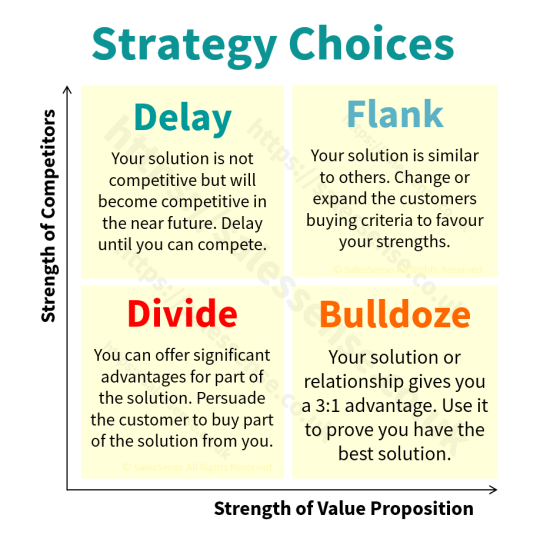Simple in concept, difficult to master, sales strategy can make all the difference.

It is only in recent decades that sales strategy has become common parlance in relation to competitive sales opportunities. Dictionary definitions still associate the term 'strategy' with military conquests.
These days sales strategy is widely used to mean the overarching approach to winning a sale. Yet the strategy is not the plan. An effective strategy drives the choice of sales tactics.
In its purest form, strategy applies to competitive situations where there is a clearly defined objective, purpose, or intended outcome. As such, the study of strategy, its use and the outcomes attributed to good strategy, has much to offer organisations and individuals.
Through the last decade of the last millennia, several well-known high-end sales training courses included a brief education in the use of military thinking to win particular sales opportunities. The education was brief because the sales training courses were rarely more than three days long and strategy would be covered in one of 8 or 10 modules.
The subject is huge and its study could easily fill a full-time 12-month course. A quick Google search will yield numerous examples. For me at least, one section of a training course was not enough.
I had my Team at SGi take the Holden PowerBase course which included a section on sales strategy. Later I signed up to become an accredited TAS instructor. Target Account Selling became perhaps the best known of the genre of sales training courses delivering a ‘High-Value Complex Sale’ methodology. I attended two programmes delivered by accomplished instructors and eventually got my wings. Even then, I don't think I had properly internalised the principles.
Later, after TAS was absorbed into Seibel, I built my own 'High-Value Complex Sales Methodology' training course. Through these multiple iterations including having to understand strategy sufficiently well to create a unique spin on the theme, I came to feel confident about using strategy and teaching the subject.
Why understanding sales strategy should be so difficult eludes me. I know it is difficult not just because I took a while to ‘get it’; not just because those I have tried to help understand it, seemed to find it as difficult as I did; but because so few people even now, decades after the principles began being taught in business schools, so few sales or business leaders seem to use strategic thinking effectively.
It is easy to separate a good sales strategy from a bad sales strategy. A good strategy should make the necessary actions obvious.
If required actions aren't obvious, the strategy is not serving its purpose and should be renewed or revised.
Good strategy drives tactics. It seems a straightforward concept yet finding a competitive strategy that works is not so easy.
Sporting examples are the easiest to relate to because the action takes place within confined parameters such as distance, time, or score. Let’s consider Mo Farah who won gold in both the 5000 meters and 10,000 meters at the 2012 London Olympics. It is easy to think that Mo didn’t need to outthink his competitors. He was just too good.
That in itself is a strategy that was likely ten years in preparation. “A winning general creates the conditions of victory before beginning the war“ observed Sun Tzu, 2500 years ago.
Perhaps all athletes aspire to be the best, yet so many of those that take part in top events have little hope of winning.
Each athlete has their own competition with peers of similar potential. Amongst those closely grouped, the right strategy makes all the difference. If you are dominant (have run in the fastest times) and on form, you might opt to dishearten your competitors by setting a fast pace all the way.
If you are slower than the leaders in your group, you need a different strategy that plays to your strengths.
In a sporting event, much of the competitor intelligence is published. Everyone knows or can know each other’s seasonal best performance.
While detailed intelligence about a competitive vendor’s capability may be public, discovering their plans, learning about their relationships with customer staff, and understanding the customer's unofficial decision-making process is difficult.
This is critical information. As elegantly stated by the Chinese general, Sun Tzu: “The reason competent commanders win victories, achieve outstanding success, and surpass ordinary people is that they know critical information in advance.”
More than having the necessary information, the ultimate strategist has such a grasp of the principles involved in formulating and executing an effective strategy that he or she can correctly anticipate a competitor’s intentions.
Adversaries all have observable limitations that constrain options.
Perhaps Sun Tzu’s most familiar quote is “Victory lies not in defeating the enemy but in defeating the enemy’s strategy for therein lies his vulnerability.”
There are great parallels between the circumstances of battles and those of vendors competing for a particularly attractive piece of business:
Both generals and vendors have limited resources and there will only be one winner. More so, the customer is akin to the territory that most battles are fought over.
So the lessons of military history are equally valuable in competitions between suppliers. Those with the winning sales strategy prevail.
Article by Clive Miller
If you need to increase conversion rates and win more sales, learn how to use sales strategy on an opportunity-by-opportunity basis. Let us help. Get in touch. Telephone +44 (0)1392 851500. We will be pleased to learn about your needs or talk through some options. Alternatively, Send an email to custserv@salessense.co.uk for a prompt reply or use the contact form here.












